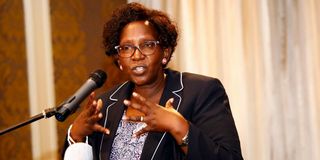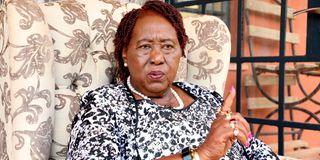They called us names, it didn't stop us: legendary women fuel Gen Zs' aspirations

Veteran politician Jael Mbogo during an interview at her homein Oloolua, Kajiado North on January 27, 2024. She is the third woman to run Maendeleo ya Wanawake as the chairperson.
What you need to know:
- The women who had refused to submit to oppressive systems from the pre-independence era shared with the young generation their hard facts about succeeding in a hostile environment.
- The women who defied rigid cultural decrees had a rough day, the hostility they endured turning out to be the zeal they needed to jump over the hurdles placed along their way.
At the feet of legendary Kenyan women, the Gen Z generation sat deeply absorbed in the moment of life hacking chat.
For those on the millennial stairs and fast pacing to the Gen X cliff, the morning of May 13, 2024, at Nairobi Serena Hotel was a time of unlearning and re-learning.
Here, the women who had refused to submit to oppressive systems from the pre-independence era shared with the young generation their hard facts about succeeding in an environment that has seemingly ganged up to deny a woman anything that she needs to live a fulfilled life.
Polycom Girls, a rights organisation, had facilitated this dialogue between the old and young women as a way of nurturing a generation of young women leaders.
“Never let anyone look down on you,” Jael Mbogo told the young women.
Jael is a big name in the history of Kenya’s women in politics. She is among the first few women who swam against the male-dominated tide to join politics immediately after independence.
In 1969, she unsuccessfully contested against Mwai Kibaki for a parliamentary seat in Donholm [subsequently called Bahati and now known as Makadara). Kibaki finally became Kenya’s third president.
She is also the third woman to run Maendeleo ya Wanawake as the chairperson, an organisation founded in 1952 by a group of European women before it was handed over to the African woman post-independence.
Jael said women who joined politics during her time were called all names that men would find. But that did not scare them off.
“The men insulted us until they had nothing left to call us. They had exhausted all the insults. So, whatever they call you today is not nothing new. We had all that and it did not stop us from achieving what we wanted,” she said.
The women who defied rigid cultural decrees too, had a rough day. The hostility they endured though turned out to be the zeal they needed to jump over the hurdles placed along their way.
Dr Linah Jebii Kilimo is a former chair of Anti-Female Genital Mutilation (FGM) Board formed in 2013 to lead campaigns aimed at ending the harmful practice in Kenya.

Former chair of Anti-FGM Board Dr Linah Jebii Kilimo. She says the “environment conspired” and pushed her to Nairobi where she joined politics through the support of Zipporah Kittony.
Her appointment by former President Uhuru Kenyatta to head the agency did not come as a surprise. She had built her own brand as a staunch fighter against FGM.
During her tenure (2003-13) as Marakwet East Member of Parliament, she consistently ran local and national anti-FGM campaigns.
Her dedication to speak up against FGM was born out of her primary school teacher’s word of inspiration. While in class, the teacher told them, women driving big cars in Nairobi were uncircumcised.
“I told myself, ‘I’m going to be uncircumcised so that I can drive a big car in that place called Nairobi.’ And that’s how the campaign against FGM started,” she said.
Dealing with the stigma of disobeying her Marakwet community’s tradition was heavy on her.
“It’s not easy walking around and seeing people covering their noses claiming you’re smelling because you’re not circumcised, and they laugh at you,” she said.
But she loved herself and knew who she was, and what she wanted, she said.
“Once you know who you are and where you want to go, the environment will conspire to push you along the path that you have decided to follow,” she said.
As for her, the “environment conspired” and pushed her to Nairobi where she finally joined politics through the support of Zipporah Kittony who was then the chair of Maendeleo ya Wanawake.

Zipporah Kittony during an interview at her home in Fourways Junction Estate, Kiambu Road on September 7, 2023.
She ended up being a two-term MP for Marakwet East. The heroines left the Gen Zs’ spirits elevated to another level.
Angela Otieno, 22, who had attended the dialogue, said she felt re-energised to focus on her political ambitions.
“Someday, I’d like to vie for a parliamentary seat. I usually hear women talk about the nightmares they go through like being called a prostitute or your backside being smeared with blood and I get chills. But listening to them gave me a sense of purpose. I think now I can handle that kind of nonsense,” she said.
Grace Peter, 26, too was inspired. She, unlike Angela, is interested in running a successful food-related business.
“I envision myself being a CEO (chief executive officer) in an executive office striking multinational deals. I’ve learnt today that it’s hard but if you put your mind to it, you’ll truly make it,” she said.
Polycom Girl's founding executive director Jane Anyango said such conversations are important to mentor the future generation of women leaders.
“We are being deliberate in having this intergenerational dialogue because having more women leaders in the future begins with nurturing the young generation of women,” she said.
“We are looking at having young women ready to take up the challenge at any time and everywhere.”





